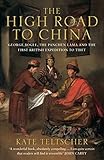Vidhi Doshi “How the East India Company became a weapon to challenge UK’s colonial past” https://www.theguardian.com/world/2017/may/06/east-india-company-british-businessman
かつて英国の対印度・中国貿易を独占し、印度帝国(ムガール朝)を政治的に支配していた「東印度会社」。ちょうど160年前の1857年に勃発したセポイの乱を契機に、国有化され、印度の統治権を喪失し、1874年に解散した。東印度会社についてこうした認識を持つのは私だけではないだろう。世界史の教科書にもそう書いてあった筈だし、Wikipediaにもそう書いてある*1。しかし、実は、その後もお茶や珈琲を扱う貿易会社として細々と続いており、何と(!)Sanjiv Mehtaという印度人商人によって買収されていた。
The company started as a ragtag group of sailors and adventurers in 1600 who set out to import spices, tea and exotic items to Europe from India. Eventually the merchants had set up trading hubs around the world, ousted kings and princes from power, and turned the company into a mechanism through which Britain controlled its empire. After the 1857 revolt, the East India Company was dismantled and replaced with the India Office in London, housed in Westminster, in the building now called the Foreign and Commonwealth Office. For years the company remained dormant, stuck in memories and history books.In India, and other former possessions of Britain, the historic East India Company is a symbol of oppression and humiliation. Mehta first learned about it as a schoolboy in newly independent India. His family had fought alongside Gandhi for India’s independence.
Mehta氏が「東印度会社」の株式を完全に取得したのは2005年のことだった。それ以来、Mehta氏は「東印度会社」を21世紀のグローバル化した世界に対応したラグジュアリー・ブランドとして再構築しようとしている;
In 2003, a group of shareholders who owned the East India Company were attempting to revive it as a business selling tea and coffee and approached Mehta to supply them.“When I met the people who owned the company, I realised that they did not understand what the East India Company means around the world. Not a single one of them was from a former colony. I knew what meaning those three words have everywhere from St Helena island, to Singapore, to Madras. I could feel it in my bones.”
Mehta started buying shares of the company in 2003. For the next four years, he spent every weekend and spare hour studying the company’s history in the British Library and archive of the Victoria and Albert Museum.
“Every ship record, every cartographer’s map, every mixologist’s recipe, every design from the first bathroom sink designed for Indian heights, to instructions on what to do if a crocodile jumps on your boat. It’s all there,” he says.
His studies inspired trips around the world, from Boston to Brisbane, even war-torn Afghanistan in 2005. “I wanted to go everywhere that the East India Company had ever set foot. I wanted to walk those streets, to see the buildings, to feel what it meant to be part of the world the company existed in.”
印度人が「東印度会社」を所有することの意味;
After his purchase of the entire company in 2005, Mehta devised a 25-year plan to turn it into a luxury products brand. Now, his London shop features a plethora of products, all inspired by the East India Company’s history, selling everything from tea and jam to gold coins and books.He conjures up his ideal customers: “An Indian-born woman who works as an investment banker, who has a Chinese-born boyfriend who is working at a start-up in the city. They want to buy a table that is inspired by their shared history. That table signifies where we want to be.”
Mehta’s vision of the world is based on a sense of interconnectedness, one which seems somewhat misplaced after the Brexit vote, and its verdict on immigration in the UK. “I don’t think politics can stop us growing closer together, especially now because of the worldwide web. The East India Company was the Google of its time. It connected people like never before.”
新「東印度会社」のサイト;
He knows that his Indian heritage means the brand can finally be reimagined with a new spin – the company’s story can now be cast as the ultimate victory of the immigrant over his colonial past, the final triumph of David versus Goliath.“The fact that an Indian now owns the East India Company, means that the negative has become a positive.
“The historic East India Company built itself on aggression, but today’s East India Company is about compassion,” he says. “It belongs to the entire Commonwealth of nations, to millions of people around the world. It is part of our shared history.
http://www.theeastindiacompany.com/
http://www.eastindiacompany.jp/
「歴史的東印度会社」については、浅田實『東インド会社』、またKate Teltscher The High Road to China: George Bogle, the Panchen Lama and the First Brtish Expedition to Tibet*2をマークしておく。また、
William Dalrymple*3 “The East India Company: The original corporate raiders” https://www.theguardian.com/world/2015/mar/04/east-india-company-original-corporate-raiders

- 作者: 浅田實
- 出版社/メーカー: 講談社
- 発売日: 1989/07/17
- メディア: 新書
- 購入: 1人 クリック: 18回
- この商品を含むブログ (13件) を見る

The High Road to China: George Bogle, the Panchen Lama and the First British Expedition to Tibet
- 作者: Kate Teltscher
- 出版社/メーカー: Bloomsbury Publishing PLC
- 発売日: 2007/08/06
- メディア: ペーパーバック
- クリック: 1回
- この商品を含むブログ (5件) を見る
*1:Eg. https://en.wikipedia.org/wiki/East_India_Company https://ja.wikipedia.org/wiki/%E3%82%A4%E3%82%AE%E3%83%AA%E3%82%B9%E6%9D%B1%E3%82%A4%E3%83%B3%E3%83%89%E4%BC%9A%E7%A4%BE
*2:Mentioned in http://d.hatena.ne.jp/sumita-m/20130223/1361640990 http://d.hatena.ne.jp/sumita-m/20131015/1381855788
*3:http://www.williamdalrymple.uk.com/ See eg. https://en.wikipedia.org/wiki/William_Dalrymple_(historian)